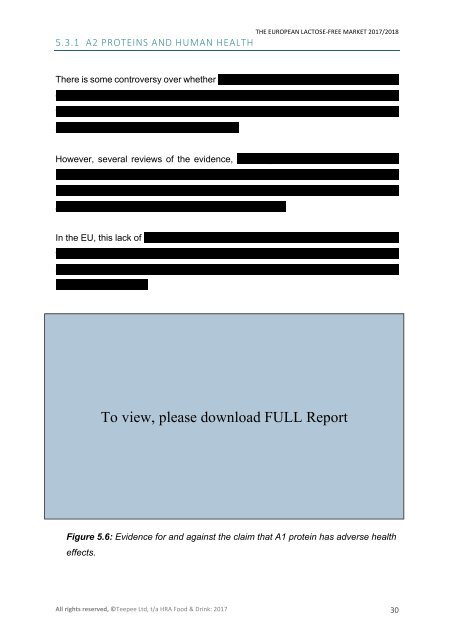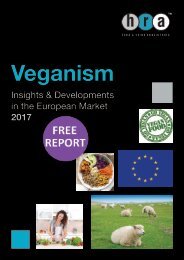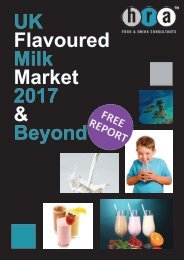European Lactose-Free Market Report 2017/2018 Report
Dying to know what’s going on in the hottest Free From category? Looking for something different to those tedious reports filled with nothing but data and no insight? Looking for detailed category analysis from experienced specialists to give your brand the ‘Edge’?
Dying to know what’s going on in the hottest Free From category?
Looking for something different to those tedious reports filled with nothing but data and no insight?
Looking for detailed category analysis from experienced specialists to give your brand the ‘Edge’?
Create successful ePaper yourself
Turn your PDF publications into a flip-book with our unique Google optimized e-Paper software.
5.3.1 A2 PROTEINS AND HUMAN HEALTH<br />
THE EUROPEAN LACTOSE-FREE MARKET <strong>2017</strong>/<strong>2018</strong><br />
There is some controversy over whether A2 proteins have an adverse effect on human<br />
digestion (see figure 5.6). Since the 1980’s, theories have emerged hypothesising<br />
that the b-casein protein slows gut transit time, permeates the gut wall into the blood<br />
stream, and increases digestive complaints. 23<br />
However, several reviews of the evidence, including one from the <strong>European</strong> Food<br />
Safety Authority (EFSA), have not found any conclusive associations between A2<br />
proteins and adverse health effects. The EFSA review did however admit that A1 and<br />
A2 proteins are digested differently by the human body. 28<br />
In the EU, this lack of scientific consensus creates challenges for businesses such as<br />
the a2 Milk Company, as it is against the law to make health claims that have not been<br />
substantiated by the <strong>European</strong> Commission. This causes barriers in marketing<br />
produce to consumers.<br />
Evidence for<br />
Evidence against<br />
“Consumption of milk containing A1<br />
β-casein was associated with<br />
increased gastrointestinal<br />
inflammation.”<br />
Sun et al (2016) 25<br />
“This review concludes that there is<br />
no convincing or even probable<br />
evidence that the A1 beta-casein of<br />
cow milk has any adverse effect in<br />
humans.”<br />
Truswell (2005) 26<br />
To view, please download FULL <strong>Report</strong><br />
“Results suggest differences in<br />
gastrointestinal responses in some<br />
adult humans consuming milk<br />
containing beta-casein of either the<br />
A1 or the A2 beta-casein type.”<br />
Ho et al (2014) 27<br />
“A cause-effect relationship<br />
between the intake of [A1 proteins]<br />
and non-communicable disease<br />
cannot be established.”<br />
EFSA (2009) 28<br />
Figure 5.6: Evidence for and against the claim that A1 protein has adverse health<br />
effects.<br />
All rights reserved, ©Teepee Ltd, t/a HRA Food & Drink: <strong>2017</strong> 30







